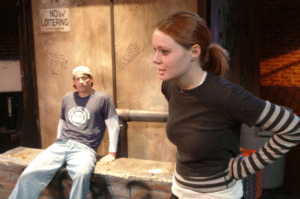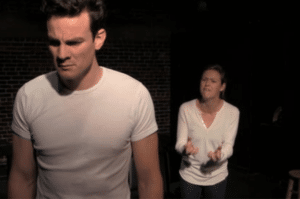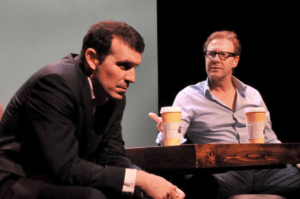Why Study?
I’ll go ahead and say it: Acting is a profession more tolerant of lack of ability than perhaps any other. You can actually make a fair sum of money in acting without knowing much about how to act, and I take no satisfaction in making that statement. It’s frankly embarrassing. But there is such a thing as proficiency, and in the end, proficiency will win. If you’re serious, if you want to last more than a year or two in show business, if you have any sense of professional ethics, then proficiency is what you should be pursuing first and foremost.

But yet these days, more and more, serious study can be devalued as something outdated and unnecessary, and “competence” measured not by your demonstrated ability, but by whether you have listed on your resume some in-vogue piece of micro-training that is seen as potentially linked to being hired. Or you might get a certain job purely because of how you look, and after that you are judged competent because, well, someone hired you already for that job. The jobs keep coming without your ever really having known why or how.
Part of the Big Frustration with pursuing an acting career no doubt comes from this rather tenuous relationship between competence and employment. The writer starts the ball rolling with a script, and actors are among the last hired to complete the team in charge of getting this story to the public. There are a million stories, of infinite quality, across an increasingly crowded spectrum of content delivery. Many of those stories simply don’t require “high achievement acting” to do their job or make a lot of money. But in any case, the lead character who is in every scene? Actor. The guy who pops his head in with one line? Actor. The background players? Actors. The film that just won 15 Oscars? Full of actors. That daytime soap? Full of actors. That sketch comedy show? Actors. All considered to be professional, they’re all being paid something, but the range of actual competence is staggering. The number of actors who are being paid something to act in something every day far exceeds the numbers in other professional art forms, or in sports. The entire NFL is fewer than 2,000 players. The entire NBA is fewer than 500 players. You gotta be good — clearly, demonstrably, seriously good. Now, how many actors do you think are being used across the entire spectrum of storytelling and content delivery — just domestically? It has to be at least many, many thousands, every day.

It’s hard to get your head around it, because in just about any other field of endeavor, a proven level of competence would seem clearly to be a necessary prerequisite for getting paid, and usually that competence is easily identified through a known, highly visible technique: Hey! Look at that violinist! She must have spent a bazillion hours of practice to get that good. Hey! Look at that athlete! Imagine how much dedication and training it takes to be that good. Medicine, technology, cooking, the various building trades — could anyone make an argument to the contrary? I don’t think so. Joining a union in some other skill usually requires a certain number of years, with measured hours on the job in various capacities. In acting? You can join SAG-AFTRA by being a background player, and the single union now covers actors, radio deejays, and TV meteorologists. The union has zero proficiency requirements, and the notion of acting proficiency itself is highly subjective. With acting, the better the technique, often the more invisible it is, and you just see a “person” in a story.
In the near term (under 5 years chasing acting professionally), it can appear that actual competence has little role to play in your career. It just seems too much a lottery, and that some lucky new person who’s been in town three weeks gets a great audition or books a swell job or signs with that perceived awesome agent/manager, while you, perhaps trained and responsible and caring and artistic and dutifully having adhered to the latest diet regimen – you are unfairly left behind, unrewarded for hard work, talent and sacrifice.

Hence one can see a hell of a lot of randomness in the actions of actors in the early chapters of this strange novel – constant changing of teachers, approaches, philosophies, desperate grabs at weird projects, too many bad plays, too many bad comedy skits, a sudden veering toward improv workshops, no, sitcom workshops, no, on-camera workshops, no, such-and-such a motivational speaker, no, a new Significant Other, no, back to the old Significant Other, no, New York, no, Los Angeles, no, writing, no, new agent, no, new manager… On and on it goes. Actors can veer from one major decision to another along the steep, jagged slopes of morale and inspiration that mark the early part of the journey. There’s always a nice little high you get from making a decision, implementing some sort of change, but around the bend awaits the same old discouragement when this change didn’t yield the desired result: regular acting work, a feeling you’re breaking through at last.
But as you move past five years in the profession, I’ve observed that the business does become more and more a meritocracy. Yes – there’s always politics, celebrity, vapidity, nepotism and money at work (as they are in all industries), but overall there is a meritocratic response. If you look at actors you admire who have been at it for 20 years or more – they really do know how to act, and how to comport themselves in professional situations. Even the character types who aren’t celebrities but work all the time – they know what they’re doing. You rarely see a total no-talent boob who ends up ‘making it’ over the long haul. In the end, I believe talent, or frankly more importantly, professional competence, wins.
Certainly for Type-A super-achievers, who are used to being recognized as such in more conventional environments like job-jobs and fixed-size organizations where their competence shines quickly and is rewarded, the morass of The Biz and its seeming non-responsiveness to their intelligence, responsibility, and work ethic is particularly infuriating.
But proficiency will win. In the end, it will win. It’s a proficiency with acting on a technical level, but also with managing your own morale, and building a career, managing that. A lot of success is just built on being there, day after day, being good at the little things day after day, having people walk away from working with you glad for the experience, day after day. A few years in the business will bring that much more certainty about the various skills, what to do, how to do it, who can help, how you can get them to help – perspective. Some actors have an innate maturity that lends itself better to older parts, and their 20’s may just be a long training period as they wait for their look and their casting to match up with the music inside. Others need to break out of bad 20-something romances, or get off the parental dole, or develop a stronger work ethic, or knock off the [insert non-optimum life situation here] – all of this in addition to developing their skills as actors.
Don’t indulge the manic panic. You’ve set upon a course as a performing artist, and while it can feel as if career certainty has gone out the window, the wheel slowly turns and you get better, wiser, more connected to the business – and the business will respond. Life can be unfair, the world unjust — for sure. But try not to make too many major veering decisions on those early jagged slopes, thinking that those micro-level moves will have a major effect on the slow turning wheel of your career. The house-of-mirrors freak show that no doubt seems to describe your thoughts, feelings, confidence and psychology on any given day frankly matters very little. Persistence, diligent work on your skills, supplemented by increasing and steady career administration – that’s what will fuel the wheel’s rotation, and lead you ultimately to proficiency, professional competence, and measurable results over time.
